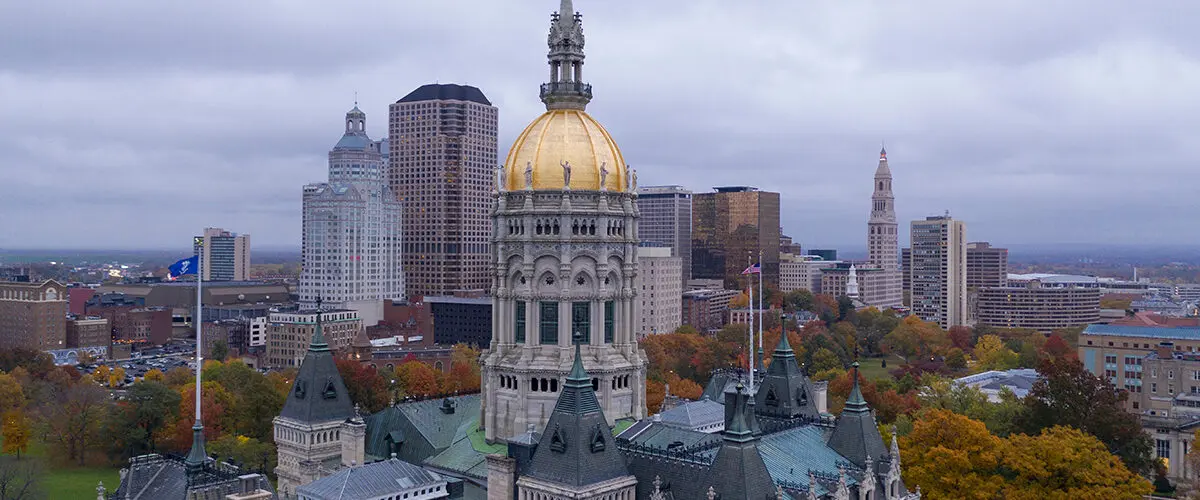Connecticut Legislative Update
When the final gavel came down in Hartford on May 4, Connecticut passed historic climate legislation. After 3 years of mediocre to dismal results striving to fight greenhouse gas emissions from transportation and buildings the passage of the Connecticut Clean Air Act was itself a breath of fresh air.
People from all walks of life came together to make this happen. True, it took some time, but over the last 2 to 3 years this broad-based human effort has been building, restructuring, changing and growing. One of the reasons for this success was the comprehensive policy known as the Transportation Climate Initiative (TCI). But TCI went up in flames in 2021, so how could it be responsible for Connecticut’s success this year?
The people. The people fought to refine the transportation message. They revamped the Transportation Climate Coalition and worked toward tackling emissions. Advocates talked in plain language, and put equity into every message, not as an afterthought or an add-on but as a central framework of all our goals. What was the message that resonated and finally got the attention of legislators? Climate change is real. Entire communities are becoming permanently sick. Our children can’t get to school safely. We are unable to afford clean transportation options. Finally, the people were heard, and decision-makers responded.
SB 4 – The Connecticut Clean Air Act – was passed. It includes:
- Electrification transit buses
- Phasing out of diesel school buses for environmental justice communities by 2030, 100% zero-emission and alternative fuel for the state in 2035 and 100% zero-emission by 2040 for the state.
- Electric Vehicle rebates: focused on low- and- middle income residents
- E- Bike rebates: minimum of $500 for up to $3000 bike
- Implementation of the California emission standards on medium-and -heavy duty vehicles
SB 4 gives Connecticut’s Department of Energy and Environmental Protection (DEEP) the authority to move forward with medium- and heavy-duty vehicle regulations adopted by a growing number of states from coast to coast, including California, Massachusetts, New Jersey, New York, Oregon, and Washington. This will allow the state to proceed with adoption of various life-saving regulations that address nitrogen oxide (NOx) pollution and would put more zero-emission trucks on the road, including the Advanced Clean Trucks rule and the Heavy- Duty Omnibus rule.
These rules will deliver clean air by deploying more electric trucks and by slashing pollution from diesel trucks currently on the roads. The bill also invests in and transitions the state fleet, transit buses, and school buses to electric, introduces consumer e-bike rebates, and expands access to electric vehicle charging.
This bill encompassed many of the goals of TCI and boldly put equity front and center. The coalition of people brought together 2 to 3 years ago reached back into the communities and said, “join us now, together we can do this.” And the people did. Real momentum built and the legislative champions were emboldened. People started to see the path forward. Decision makers were out of the building riding e- bikes and driving EVs. How does this make a difference? Because talking directly to each other…. on the grass, outside the halls for the capital, creates an environment where all are heard and everyone was learning and listening. The time for meaningful climate change policy was within reach.
Acadia Center is proud and honored to have helped create this victory in Connecticut. Acadia Center uses our data and research to make the case for good policies to be passed. The case is made with modeling, analysis, research, and dissemination of important and compelling reports to decision-makers who can vote to change the status quo. The community, advocates, and legislators worked together to make a difference.
Other significant legislation that passed the 2022 session
- Substitute for SB 176, AAC Shared Clean Energy Facilities
- Public Act No. 22-14 – signed by Governor on 5/10/22 (ceremonial bill signing yesterday)
- S.B. No. 10 An Act Concerning Climate Change Mitigation
- Public Act No. 22-5 – signed by Governor on 5/10/22 (ceremonial bill signing yesterday)
- Substitute for SB 93, AAC Commercial Property Assessed Clean Energy Program
- Public Act No. 22-6 – – signed by Governor on 5/10/22
- S.B. No. 94 An Act Concerning Certain Modifications To Gas Pipeline Processes
- Public Act No. 22-20 – signed by the Governor on 5/10/22
- Substitute for SB 4, AAC The Connecticut Clean Air Act
- Public Act No. 22-25 – signed by the Governor on 5/10/22
- HB 5506, Budget Adjustments and Implementer
- Signed by Governor on 5/7/22
Bills Transmitted to the Governor
- S.B. No. 277 An Act Establishing A Trash-To-Energy Working Group
- Special Act No. 22-11 – waiting for Governor’s signature
- H.B. No. 5327 An Act Concerning Energy Storage Systems And Electric Distribution System Reliability
- Public Act No. 22-55 – waiting for Governor’s signature
- Substitute for HB 5200 AA Establishing A Task Force to Study Hydrogen Power
- Special Act No. 22-8 - waiting for Governor’s signature
- H.B. No. 5202 An Act Exempting Existing Nuclear Power Generating Facilities In The State From The Nuclear Power Facility Construction Moratorium
- Public Act No. 22-76 – waiting for Governor’s signature




















Follow us